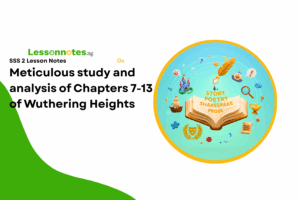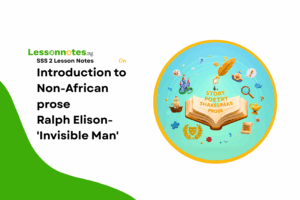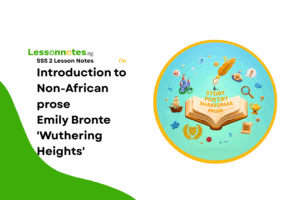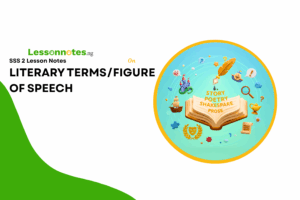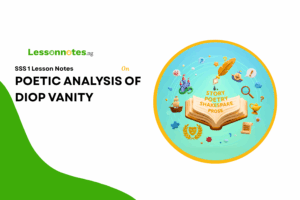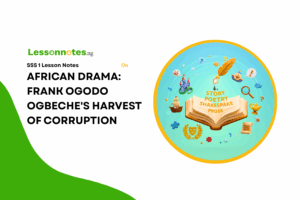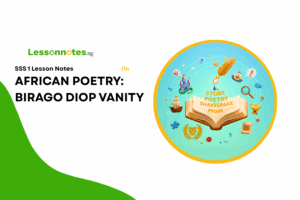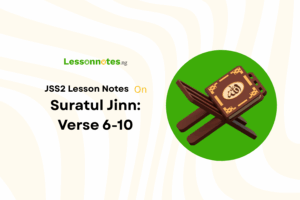Poetic Analysis Of The Proud King SS1 Literature-in-English Lesson Note
Download Lesson NoteTopic: Poetic Analysis Of The Proud King
POETIC DEVICES
- Biblical Allusion: The story of the poem, ‘The Proud king’ is similar to the bible story of King Nebuchadnezzar. He is noted in the bible to have a similar fate to that which King Jovinian witnessed due to pride and neglect for God. King Nebuchadnezzar was a powerful king that no other throne in his reign as a king could challenge in every respect of kingship. But God decided to teach King Nebuchadnezzar a lesson by making him act like an animal and he was rejected by his people to be king over them. For good seven years, Nebuchadnezzar was rejected and he could not sit on the throne until he cried to God for mercy and forgiveness. So Jovinian’s experience models itself after that of King Nebuchadnezzar.
- Rhetorical Question: The major poetic device that dominates this poem is the use of rhetorical questions. This is used by King Jovinian who found himself in a mess. Some of it includes: ‘Lord God, what bitter things are these?/What hast thou done, that every man that sees/This wretched body of my death is fain?… Why am I hated by everyone? Wilt thou not let me live my life again….’ When he met with the priest, he asked: ‘Father…knowest thou Jovinian? Knowest thou me not, made naked, poor and wain?
Alas, O father! Am I not the King?’
- Antithesis: There is a big contrast in the way King Jovinian lived his life before he lost his throne to an angelic figure and the moment he was helpless out there in the streets in search of help to regain his throne. The affluence that surrounds is a complete opposite of the penury and lack he witnesses in less than twenty-four hours. Antithesis can also be seen in his conduct when he returned as king which is the exact opposite of what he displayed before he was displaced as king.
- Irony: The poem is full of powerful ironies but the most prominent ones are the claim of the impostor that he has been a king for many years and his own real name too is Jovinian.
The impostor claims that his mother, the Queen, delivers him as a baby boy in that house to his royal father (When in this house the Queen my mother bore/unto my longing father…). Another irony is in the Queen’s speech when the impostor asks her to speak. She says: ‘Thou art the man/By whose side I have lain for many years/Thou art my lord Jovinian life and dear. The mistaken identity on the part of the Queen contributes a lot to dramatic irony.
- Narrative Poem: A clear examination of the poem will reveal that the poem adopts a narrative style as its rendition medium. With this, the poet-speaker effectively narrates a quaking experience a proud king went through. It was a trajectory of shame that King Jovinian was forced by a supreme power to observe in order to effect an adjustment in his conduct and manners.
THEMES
- The theme of pride: Pride is seen to be the major theme of the poem, ‘The Proud King’. And it is said that pride goes before destruction and a haughty spirit before a fall. An assessment of the first eight stanzas will reveal that King Jovinian displayed great arrogance even toward God that he says he has no need of temple and priest. In his words, his father’s reign and throne can only be measured by the portion of land where he keeps his dogs.
Hence, he calls it the prince of narrow land. These and many more are the reasons why God decided to teach Jovinian a lesson that he can take away from the minds of his subordinates’ recognition of their King from them. So, an angelic figure was sent to humble King Jovinian who understood at the end that God alone deserves the kind of praise he ascribed to himself.
- Sovereignty and Supremacy of God: The poem is an evident statement on the supremacy of God over all humans no matter the power and position. God’s dealings with Jovinian portray this fact as in stanza 93, Jovinian recounts that ‘God is good/….and good hope I have/of help from Him that died upon the rood/And is a mighty lord to slay and save…. Also in the words of the angelic figure: ‘The God that made the world can unmake thee.’ He continues, ‘Thou hast learned how great a God He is/Who from the heavens countless rebels drave.’ Here, he refers to Satan and his associates.


